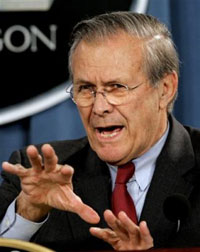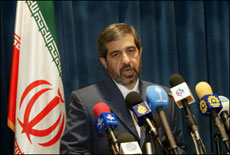|
Saudi Warns US Policy "Hands Iraq Over to Iran"
 |
|
"Now we are handing the whole country over to Iran without reason," Al-Faisal said.
|
NEW
YORK, September 21, 2005 (IslamOnline.net & News Agencies) –
Defiant Iran dismissed Wednesday, September 21, US accusations of
playing a destabilizing role in its one-time arch rival neighbor and
war-ravaged Iraq, but Saudi Arabia also voiced its concern, accusing
US handling of risking the take-over of the Arab country by Shiite
Iran.
"The
US policy in Iraq is giving a free hand for the Iranians in the
war-ravaged Iraq," Saudi Foreign Minister Saud Al-Faisal warned
Tuesday, September 20, according to Agence France-Presse (AFP).
Speaking
to the US Council for Foreign Relations in New York, the Saudi top
diplomat reminded the US of Saudi assistance adding that: "We
fought a war together to keep Iran out of Iraq after Iraq was driven
out of Kuwait," said Faisal, referring to the first Gulf War in
1991, when Saudi Arabia fought with US and other allied forces to
liberate Kuwait from Iraqi forces.
"Now
we are handing the whole country over to Iran without reason," he
wondered.
The
minister went further to say the US is widening the gap between the
Iraqi Sunnis, Shiites and Kurds, adding that what the Americans were
doing would bring about civil war to Iraq.
"If
you allow civil war, Iraq is finished forever."
 |
|
"They (Iranians) are interested, they are involved and they are active. And it's not helpful," Rumsfeld said.
|
"The
US has always been speaking of Arab Sunni insurgency which they were
opt to fight while they favor the Kurdish-and Shiite-dominated
government," the minister added analytically.
Such
a conflict, he said, would bring in Iran because of its interest in
the Shiite-dominated southern part of Iraq, the Turks because of their
concern about an autonomous Kurdish surfacing in the north, and Arab
nations in the region.
Iranians,
Faisal said, go into areas that American forces have pacified and
"pay money ... install their own people (and) even establish
police forces and arm the militias that are there."
"And
they are protected in doing all this by the British and American
forces," he added.
The
only way out is to bridge the gap among Iraqi sects, said the Saudi
minister, adding the US needed "to bring these people
together."
Saudi
Arabia has voiced fears that an Iraqi constitution, due to be put to a
referendum in four weeks, could split the country apart and
disenfranchise Sunnis.
Iran
Accuses US
 |
|
"The occupiers should evacuate and let Iraqis govern themselves so peace, stability and democracy returns to Iraq," Asefi said.
|
The
Saudi accusations coincided with US warnings to Tehran against the
Islamic Republic's meddling in Iraqi affairs.
"They
(Iranians) are interested, they are involved and they are active. And
it's not helpful," US Secretary of Defense Donald Rumsfeld told a
Pentagon press conference Tuesday.
He
made the comment after an incident in the southern city of Basra in
which British forces stormed an Iraqi police jail to rescue two
soldiers from Iraqi militiamen.
Asked
about Iranian involvement in the region, Rumsfeld said he did not know
whether it was any greater today than it has been in the past, but
said "you can be sure the playing field is not even there."
"My
guess is in the last analysis that the overwhelming majority of the
Iraqis, including the Iraqi Shiite, are more Iraqi than they are
Shiites. They are more Iraqi Shiites than they are Iranian Shiite. And
that, you know, you can overplay your hand," he said.
But
the Iranian government denied the accusations, insisting it had no
negative undermining presence in its neighbor, adding that all the
trouble Iraq faced was due only to occupation.
"The
occupiers should evacuate and let Iraqis govern themselves so peace,
stability and democracy returns to Iraq," Iranian foreign
ministry spokesman Hamid Reza Asefi told state news agency IRNA.
"The
news published recently is baseless and fictitious, and it is
circulating to cover up occupying forces' inability to provide
security in Iraq."
"From
the beginning of the Iraq crisis, Iran has played a constructive role
in providing security in Iraq and, in doing so, has had constant
contact with the Iraqi government and different groups," Assefi
responded to the US allegations.
|